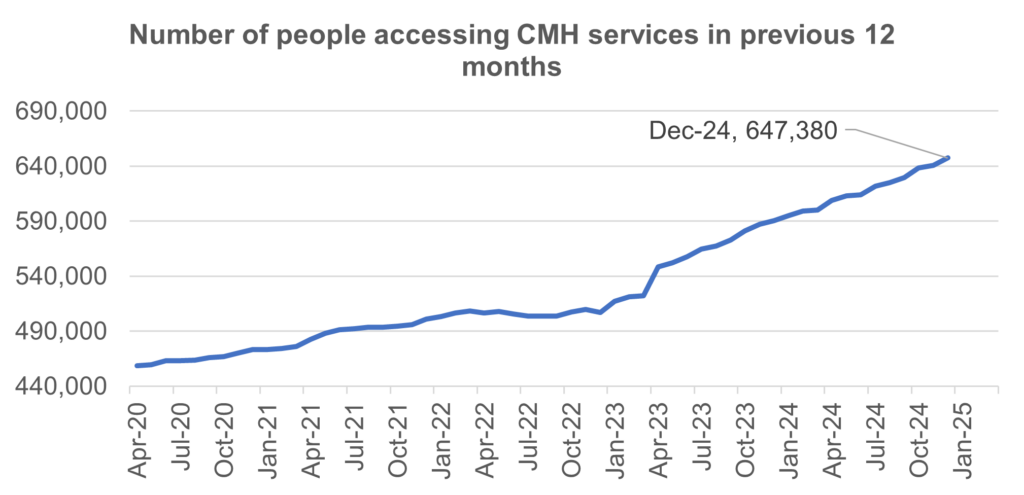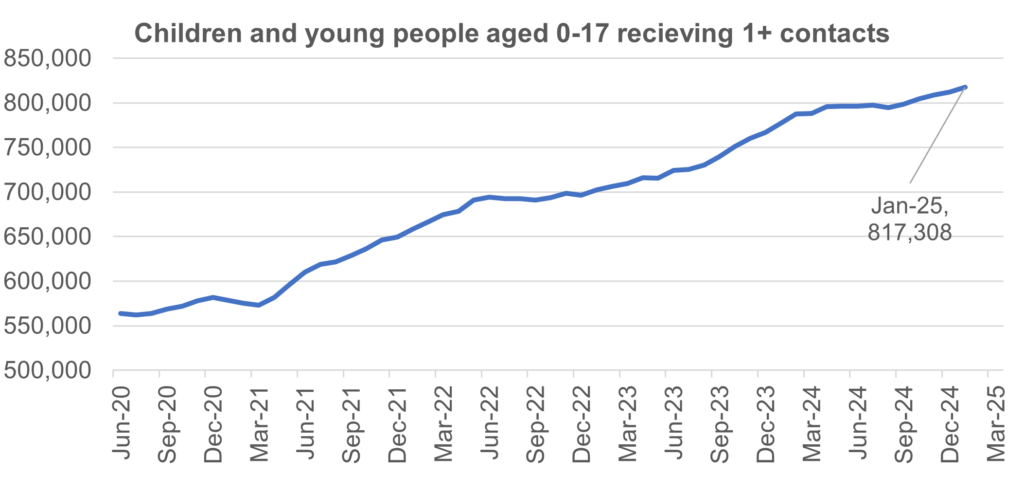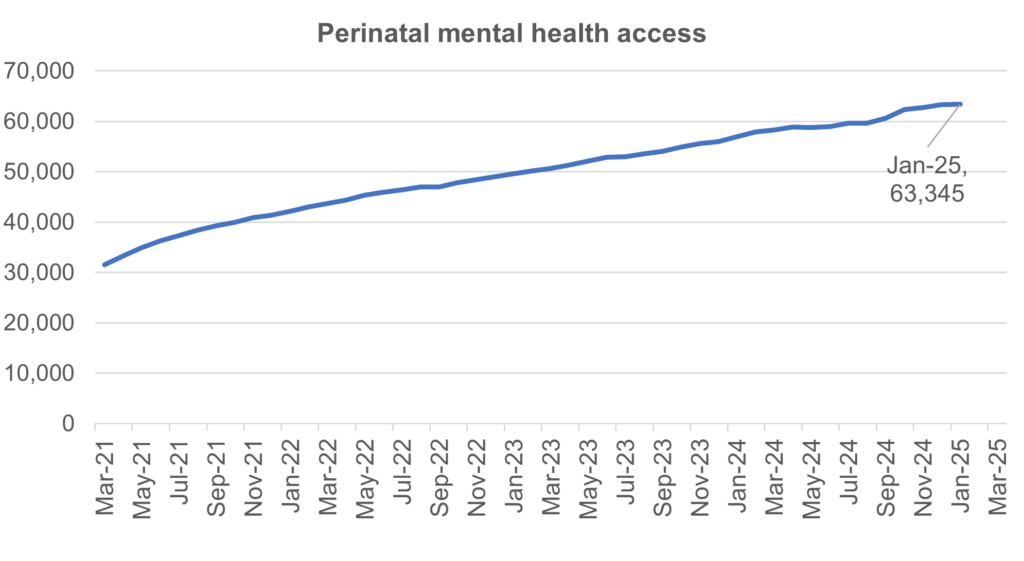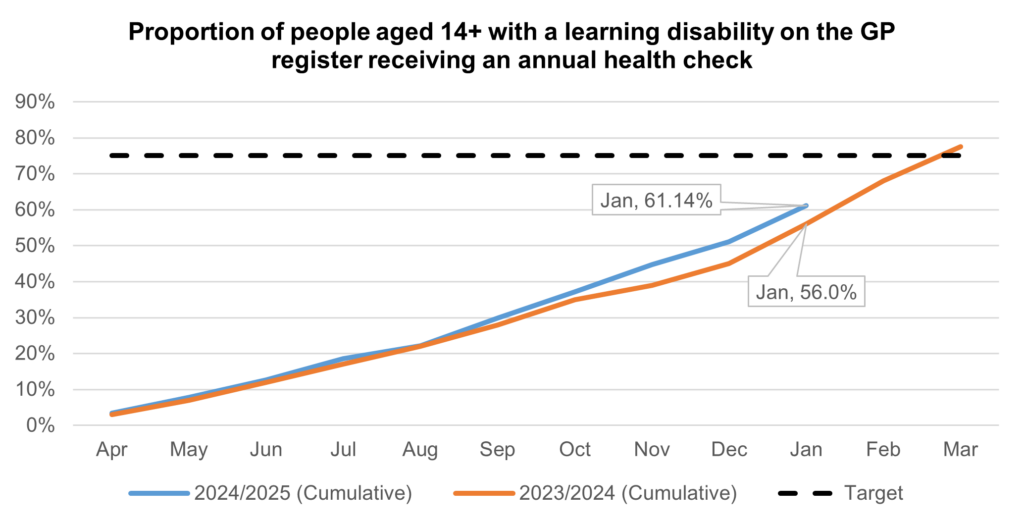Executive summary
As we continue to measure our performance against the 2024/25 planning guidance objectives, our overall priority remains the recovery of our core services and productivity to improve patient experience and outcomes. This annex provides details of performance and work being undertaken to improve those services in our wider priority operational areas (those not covered by the monthly operational statistics reporting).
Primary care and community health services
1. In 2024/25 we are aiming to make it easier for people to access community and primary care services, particularly general practice and dentistry. We also are improving patient experience through expanding capacity, ensuring people can see a clinician when they need to and increasing use of the NHS App, on information access, routine services such as repeat prescriptions, and booking appointments.
2. As at the end of January 2025, there have been 382.6 million GP appointments in the previous 12 months. This includes COVID-19 vaccinations and primary care network appointments and is an increase of 23% versus 12 months ending March 2019/2020.
3. In January 2025, 52.6% of all practice appointments took place on the same day or day after booking. This compares to 53.2% in December 2024 (a decrease of 0.6%) and 52.8% in January 2024 (a decrease of 0.2%). Over the last 3 years, the percentage of appointments seen on the same day or day after booking decreased in January compared to December.
4. Just over 8 out of out of 10 practice appointments (82.7%) took place within 14 days of booking.
5. Patient experience continues to improve. For example, the latest publication of the Health Insight Survey, published 27 February 2025 and reporting data for Wave 7 (7 January 2025 to 29 January 2025), reported:
- An estimated 95.4% of adults who had tried to contact their GP practice in the last 28 days were successful. 78.8% were able to contact their GP on the same day, up 2 percentage points from Wave 1 (23 July to 15 August 2024).
- 74.8% perceived their overall experience as ‘Good’; this has also increased consistently over the first four waves, from 67.4% in Wave 1.
- 52.6% of adults reported having an NHS dentist; of those who attended an NHS dental appointment in the last 28 days, 89.6% were ‘Very satisfied’ or ‘Satisfied’ with the care they received.
6. In January 2025, 1,058,718 referrals were waiting for a first treatment from a community health service. From this, the largest waiting lists were for: adult musculoskeletal service (333,186, a 0.1% decrease from the previous month); children and young people’s community paediatric service (153,154, a 14% increase from the previous month); and adult podiatry and podiatric surgery (106,954, a 2.6% decrease from the previous month).
7. The community services with the largest proportion of people waiting over 52 weeks in January 2025 were children and young people’s community paediatric services (32.9%), adults weight management and obesity services (12.4%) and children and young people’s nursing and therapy teams (7.9%). Increases in the community waiting list are partly driven by improvements in completeness of community waiting list data.
Mental health
8. Despite the significant demand for and ongoing pressure across mental health services, transformation across the system continues in order to improve access to timely and high-quality care for patients, particularly for children and young people.
9. Access to community mental health services (CMH) is steadily increasing with 647,380 people receiving 2 or more contacts as of December 2024, compared to 590,388 in December 2023. Access to Transformed services is 591,368 as of December 2024 and the planning target is 400,000.
Number of people accessing community mental health services in the previous 12 months

10. The number of people who have completed an NHS Talking Therapies course of treatment in 2024/25 is 561,023 between April 2024 to January 2025, compared to 561,855 in the between April 2023 and January 2024. In January 2025, 47.5% of those have achieved reliable recovery, with 67.5% achieving reliable improvement. The number of people completed NHS Talking Therapies course of treatment in the rolling 12 months to January 2025 was 669,733 against a target of 700,000.
11. Access to Individual Placement and Support (IPS) services is an evidence-based approach to help people with mental health issues find and keep paid jobs. In the year to December 2024, 41,260 people have accessed this service, compared to 34,098 in December 2023.
12. Improving inpatient flow remains a key priority. NHS England continues to support systems on data issues and sharing best practice to improve flow and reduce inappropriate out of area placements. Work continues with the Getting It Right First Time (GIRFT) programme to offer additional support to challenged systems by working with a small number of providers to address data quality issues and for them to learn from strong performers. The Department of Health and Social Care and NHS England are working on a deep dive into mental health discharge to identify future national actions to improve care and reduce length of stay. This is due to report this autumn.
13. As of January 2025, 817,308 CYP aged 0–17 received support (1+ contacts) from an NHS-funded service against a target of 840,254, compared to 777,278 in January 2024.
Children and young people aged 0-17 receiving 1+ contacts

14. CYP eating disorder (ED) pathways continue to be challenged. As of December 2024, 81.9% of routine CYP ED referrals were seen within four weeks, and 80.8% of urgent referrals were seen within one week, compared to December 2023 data which showed 79.5% and 73.7% respectively. NHS England continues to work with providers to improve the quality and completeness of data submissions to improve overall reporting.
15. In the April to January 2025, 608,299 women accessed perinatal mental health (PMH) and maternal mental health services (MMHS) compared to 540,083 in the year to January 2024. NHS England continues to work with providers to improve quality of reporting and to share best practice. As of January 2025, 63,345 accessed perinatal mental health services against a target of 66,000.
Perinatal mental health access

16. The dementia diagnosis rate (DDR) in those aged 65 and over was 65.4% in January 2025 compared to 64.4% in January 2024. The number of people with a recorded dementia diagnosis has reached 496,000. NHS England sponsored 14 sites to pilot the DiADeM (Diagnosing Advanced Dementia Mandate) protocol, supporting configuration of alternative pathways for dementia diagnosis via care home settings. All pilots were completed at the end of May 2024, and it is anticipated that learning will be shared by end of Q4 2024/25. NHS England has committed to developing reporting against the nationally held data and information set out in the Patient and Carer Race Equality Framework (PCREF) for 2024/25.
Learning disabilities and autism
17. Provisional data for January 2025 shows a further decrease in the number of adults with a learning disability and/or who are autistic in a mental health inpatient setting from December (1,875 down to 1,845). This is a reduction of approximately 8% from the inpatient population as of March 2024.
18. As of January 2025, provisional data shows there were 220 inpatients under the age of 18 with a learning disability and/or who are autistic. Numbers have continued to drop since November 2024 after a 3-month uptick from August-October. This variation at least partly reflects the relatively low numbers of under 18 inpatients there are in comparison to adults, therefore any change in trend must be treated with caution.
19. There has been an increase in the number of people receiving an annual health check compared to the same period last year. Up to January 2025, 61.14% of people on GP learning disability registers received a check, compared to 56% between April and January 2024. We remain on trajectory to achieve the 75% annual health check target by March 2025.
Proportion of people aged 14+ with a learning disability on the GP register receiving an annual health check

20. As of December 2024, there were 336,391 people aged 14 and over on GP learning disability registers, representing a decrease of 14,324 (4%) compared to the position in December 2023.
Prevention and long-term conditions
21. A total of 10 dental and eight optometry sites have been selected to take part in the pilots to test the effectiveness of blood pressure checks in wider primary care settings and funding has been transferred to systems to support. A community of practice group has been set up to support successful sites to share good practice. As of February 2025, 13 sites have gone live, remaining sites are expected to commence by the end of March. The pilots will run until summer 2025 and the evaluation partner (South West Health Innovation Network) will report on their findings by Autumn 2025.
22. From 2016 to December 2024, over 1.8 million referrals have been made into the Healthier You NHS Diabetes Prevention Programme, with the programme to set to achieve or exceed the ambition of 160,000 new participants benefitting from the programme in 2024/25.
23. National review of 26 mechanical thrombectomy (MT) sites with National Medical Director Steve Powis has been completed supporting the ambition to increase access. Follow up visits to select sites are being arranged with Prof Powis between April and July 2025.
24. To support the improvement in the time it takes for patients to be transferred from non-heart attack centres to heart attack centres the ambulance service has changed prioritisation of these transfers to align with that of a Category 2 dispatch. The national guidance for inter-facility transfers has been updated to reflect this amendment for cardiac patients.
25. Following collaboration with UEC and the ambulance service, the attached agreement has been sent to all stakeholders. It is too early to review data at this stage, but feedback from the regional clinical leads has been positive and teams have reported a positive impact on transfer of patients from DGH to HAC centre.
26. This is a timely intervention as data from the latest Myocardial Ischaemia National Audit Project (MINAP) report showed greater number of Inter-facility transfers (IFTs), an increase in patients with higher-risk ST-Elevation Myocardial Infarction (STEMI) heart attacks self-presenting from pre pandemic levels of 5-7% to 10%, and that self-presenting patients have an 84-minute additional delay in their call to balloon times.
Recovery Support Programme
27. The Recovery Support Programme (RSP) provides national mandated intensive support to trusts and ICBs in NHS Oversight Framework segment 4 that have complex, deep-seated concerns around leadership, governance, finance, patient safety, quality, and/or performance. There are currently 21 trusts and 4 ICBs in the RSP. Since February, 2 organisations have transitioned out and 4 organisations have entered into RSP.
Genomics
28. The NHS Genomic Medicine Service (GMS), continues to deliver a comprehensive genomic testing offer, as set out in the National Genomic Testing Directory, which includes both whole genome sequencing (WGS) and non WGS testing. In 2023/24 the NHS GMS delivered over 809,000 genomic reports. WGS testing represents around 4% of the total genomic testing performed by the NHS GMS.
29. Minimising backlogs and the time taken to deliver a genomic test is a key priority for NHS England and NHS Genomic Laboratory Hubs (GLHs). Following significant work and prioritisation, successful steps have been taken to reduce backlogs and a number of NHS GLHs, have now eliminated their backlog and the majority have reduced in recent months. Those that do exist continue to be driven by a significant increase in growth of genomic testing in the NHS GMS. The service has been responding to a significant increase in the number of samples submitted for testing and the time taken across the genomics ecosystem for interpretation and reporting to be completed.
30. NHS England is continuing to support the Generation Study delivered by Genomics England, to sequence the genomes of 100,000 newborn babies. It is estimated that the study will identify around 200 conditions in otherwise asymptomatic babies where symptoms might not present until later in childhood. To date 18 NHS Trusts sites have gone live with supporting the Study, at 27 sites across England. Work is underway to increase the number of sites over the course of 2025.

